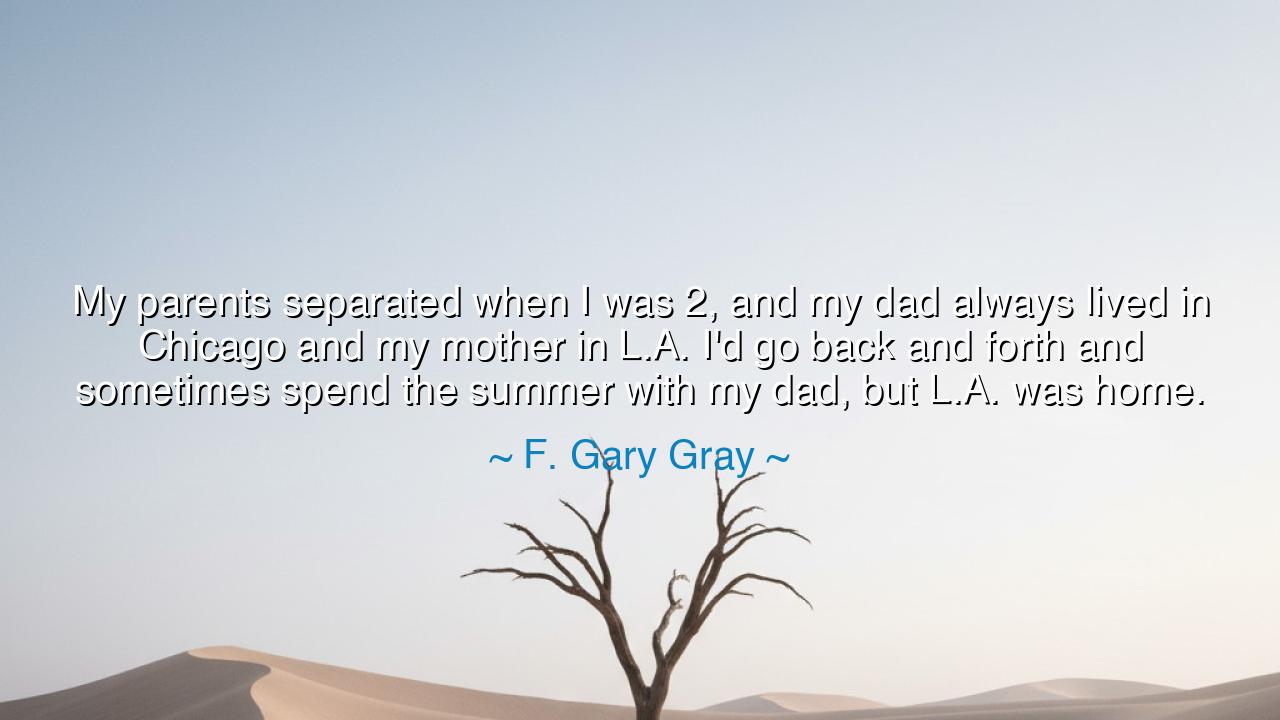
My parents separated when I was 2, and my dad always lived in
My parents separated when I was 2, and my dad always lived in Chicago and my mother in L.A. I'd go back and forth and sometimes spend the summer with my dad, but L.A. was home.






In the book of beginnings, a child speaks with the gravity of miles: “My parents separated when I was 2, and my dad always lived in Chicago and my mother in L.A. I’d go back and forth and sometimes spend the summer with my dad, but L.A. was home.” So testifies F. Gary Gray, and his words are a compass drawn on a small heart. They trace the early cartography of a life divided—two skies, two doorbells, two sets of keys—yet anchored by one hearth. The sentence carries the ache of a split map and the mercy of a chosen center.
Hear the wisdom tucked inside the simple cadence. Parents separated at 2 means the first language learned was travel: packing and parting, greeting and goodbye. Chicago brings stone, weather, and the lake’s iron horizon; L.A. brings sun-baked avenues, palm shadows, and the hum of reel-to-reel dreams. The child learns to go back and forth, to read the moods of airports and the temperature of new rooms. But the last clause is the rescue rope—“L.A. was home.” In naming home, he stacks stones against the flood; he chooses a center from which to face the wind.
This is not a rejection of the dad in Chicago nor of the summer he gave. It is the ancient art of coherence. A divided household can fracture stories; a chosen home can braid them. The boy who rides the shuttle between coasts becomes the man who cuts between scenes, who understands rhythm, contrast, and the power of the cutaway. Out of itinerancy comes craft; out of craft, a director who can hold two tones in one frame—tenderness and danger, sorrow and swagger—and make them speak to each other.
The origin of this belonging sits in the wider American tale—families stretching across geographies for work, safety, or second chances. Consider Langston Hughes, whose mother moved from city to city while his father lived in Mexico; he learned, young, to measure love across borders and to call a portable music home. His poems carry the railroad’s thrum and the porch’s hush—proof that distance can teach a soul to travel without losing itself. So too with Gray: the shuttle became a school; the school became a signature.
Let a humbler story walk beside the famous. A girl I knew kept two toothbrushes and one lullaby. One parent’s house smelled of rain and old books; the other’s, of citrus and frying garlic. Every Friday she crossed town with a backpack and a brave face. When she turned twelve, she wrote on a slip of paper, “This is home: the song that follows me.” She taped the paper inside her notebook. Years later, when she left for college, she tucked the same paper into her desk. The addresses had changed; the song had not. To name home is to make a promise to your own heart.
What lesson shall we pass down like a map folded into a child’s pocket? First, that you may honor both mother and dad while still choosing one place as your anchor. Second, that back and forth need not mean broken; it can mean bilingual in the language of love and leaving. Third, that a clear home does not cancel grief; it gives grief a chair and makes it listen while you tell your story.
Take these practices as provisions. (1) Create rituals of return—one meal, one street, one bench in a park—that make L.A. or any chosen place breathe as home. (2) Keep a travel ledger: three good things from Chicago, three from L.A., so gratitude stitches the miles. (3) Build a portable altar—a playlist, a photo, a small talisman—so your center rides with you on flights and freeways. (4) Speak the truth kindly: “I love you both; this is where I rest.” Truth turns tug-of-war into shared stewardship. (5) Transmute motion into art—journal, beats, frames—until the summer shuttle becomes a storyboard, and the ache becomes architecture. Do these, and the divided road will not divide you; it will teach you the director’s eye: to find the through-line, hold the cut, and end, always, on the face that knows where home is.






AAdministratorAdministrator
Welcome, honored guests. Please leave a comment, we will respond soon